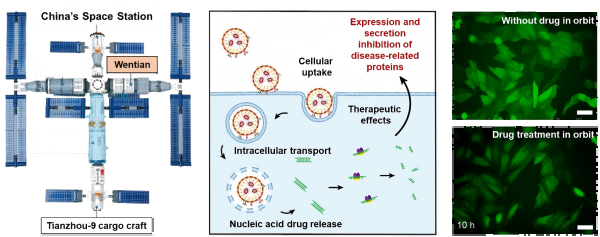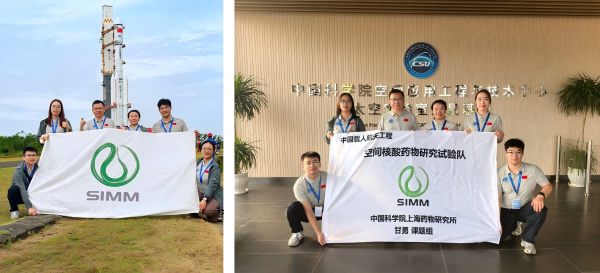Shanghai Institute of Materia Medica Conducts Nucleic Acid Drug Research Aboard China's Space Station
On July 15, 2025, the experimental materials for the project "Study on Biological Functions of Nucleic Acid Lipid Nanocarriers in Microgravity Environment", led by GAN Yong's Lab at the Shanghai Institute of Materia Medica, were delivered to the Wentian Lab Module of China’s Space Station aboard the spacecraft Tianzhou-9. This project focuses on revealing efficacy and functional mechanisms of nucleic acid drugs under microgravity conditions.
The microgravity environment can rapidly trigger various health disorders, such as muscle atrophy and dysregulation of lipid metabolism, posing serious risks to astronauts' health. Nucleic acid drugs exert biological functions based on the principle of base complementary pairing, enabling them to bind specifically to endogenous nucleic acid sequences and elicit therapeutic effects. These agents demonstrate significant application potential in space due to their high efficiency and long-acting characteristics. Understanding how nucleic acid drugs are delivered under microgravity is crucial for developing enhanced space-based therapeutic interventions. Furthermore, these findings are anticipated to assist the optimization of ground-based nucleic acid drug delivery systems.
To date, the project team has successfully performed a series of on-orbit operations, including drug administration, microscopic imaging, and sample fixation. The experimental samples have been transferred by the astronaut crew to the space station’s low-temperature storage unit, with all parameters meeting the preset conditions. These space experimental samples will be returned to Earth aboard the Shenzhou spacecraft for further comprehensive analysis.
Prof. Yong Gan's group possesses extensive experience in biomedical research and has made substantial progress in the design of nucleic acid drug carriers with efficient delivery. Their works have been published in leading international journals including Nature Nanotechnology and ACS Nano, contributing critical insights to the rational design of highly effective nucleic acid-based therapeutics.
The project team consists of Associate Researcher NIE Di, Master’s students LI Qinyu, XU Anqi, and LIU Qing, along with PhD candidates ZHANG Zhuan and TANG Yan. This research received technical support from the Technology and Engineering Center for Space Utilization and the Shanghai Institute of Technical Physics, CAS. Funding was provided by the Key Deployment Project of Chinese Academy of Sciences, the Space Application System of China Manned Space Program, the National Science Fund of Distinguished Young Scholars, the Shanghai Key Project, and the “Open Competition to Select the Best Candidates” Key Technology Program for Nucleic Acid Drugs of NCTIB.

Fig. 1. Nucleic acid drugs achieve efficient gene silencing in microgravity, significantly reducing disease-related protein expression, as indicated by diminished green fluorescence. (Image by GAN Yong's lab)

Fig. 2. Group photo of the project team.




